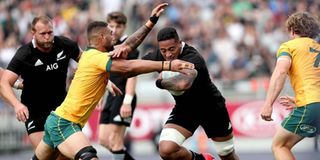How Covid-19 turned Rugby Championship into Tri Nations

What you need to know:
- The tournament was initially known as the Tri Nations, until Argentina became the fourth team in 2012.
- It has now reverted to its old name, for this year at least, after South Africa withdrew citing a lack of match practice.
- New Zealand's All Blacks won the inaugural edition in 1996 and have dominated since, claiming another 15 titles.
- Australia and South Africa have won four times each.
- The tournament doesn't start until Saturday, but the Wallabies and All Blacks have already seen action contesting the annual Bledisloe Cup, played since 1931.
Sydney, Australia
Plans for this year's Rugby Championship were thrown into chaos by the coronavirus pandemic, and when World Cup-holders South Africa pulled out the competition was rebranded as the Tri Nations featuring Australia, New Zealand and Argentina.
Here's a guide to the tournament, which starts on Saturday, and the difficulties in getting it up and running:
What is the Tri Nations?
The Rugby Championship is the southern hemisphere's premier annual tournament, and is contested by Argentina, Australia, New Zealand, and South Africa.
The tournament was initially known as the Tri Nations, until Argentina became the fourth team in 2012. It has now reverted to its old name, for this year at least, after South Africa withdrew citing a lack of match practice.
New Zealand's All Blacks won the inaugural edition in 1996 and have dominated since, claiming another 15 titles. Australia and South Africa have won four times each.
Pandemic problems
The Rugby Championship was supposed to start in August, with games in each nation, until the pandemic forced a postponement. Given travel restrictions and quarantine requirements, governing body SANZAAR decided to hold it in one country for the first time.
New Zealand were the early favourites to host, but arch-rival Australia ultimately got the nod after agreeing that teams could train together during their mandatory 14-day quarantine.
New Zealand then complained loudly about the schedule, as a December 12 finish meant their players faced spending Christmas in quarantine.
SANZAAR relented and shifted one of their games to an earlier slot, but it turned out to be academic as the Springboks, who have been under harsher Covid-19 restrictions, dropped a bombshell by withdrawing.
How will it work?
With only three teams now in contention, the number of matches has been slashed from 12 to six, played on consecutive Saturdays between October 31 and December 5, with each side facing the others twice.
One game will be in Brisbane, three in Sydney and two in Newcastle, a coastal town two hours' drive north of Sydney.
Otherwise, the rules are unchanged, with four points for a win and two for a draw. A bonus point can be earned if a team scores three tries or more than their opponent or if a team loses by seven points or less.
Bledisloe Cup
The tournament doesn't start until Saturday, but the Wallabies and All Blacks have already seen action contesting the annual Bledisloe Cup, played since 1931.
Named after former New Zealand governor-general Lord Bledisloe, who donated the huge silver trophy, the series can be anything between two and four matches, depending on whether it falls in a World Cup year.
They are playing four games this year and two are already over -- a tense 16-16 draw in Wellington followed by a 27-7 win for the All Blacks in Auckland.
The final two Bledisloe Cup Tests, on Saturday and a week later, will also be the first two games of the Tri Nations.
Los Pumas
With South Africa on the sidelines, the door is wide open for New Zealand or Australia to claim another title, with the Argentines considered a long shot.
The All Blacks and Wallabies have already played tough Bledisloe Cup games, which followed high-quality domestic Super Rugby seasons. In contrast, the Pumas haven't played a Test since the World Cup in Japan last year and have endured months of bio-secure bubbles and quarantine requirements.
Coach Mario Ledesma admits they are rusty, but they have a roster of quality players and some have been honing their skills in Europe, including winger Juan Imhoff who scored a try for Racing 92 in their recent Champions Cup final defeat to Exeter.
The core of the squad - bar the 13 late-arriving European-based players - are finally out of quarantine in Australia, where they were at least able to train together. Ex-Wallabies coach Michael Cheika has been recruited as a consultant.



